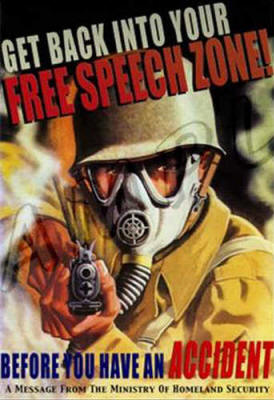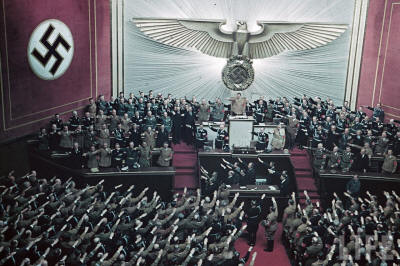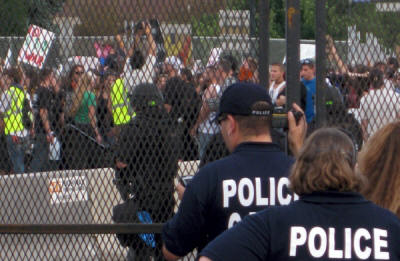
by Eric Peters
May 2, 2012
from
EricPetersÁutos Website
Now we can’t lawfully speak or peaceably assemble. Not within earshot or
sight of those who rule us, at any rate.
HR347 - the Federal Restricted Buildings and Grounds Improvement Act is now
“the law.” (More accurately, an updated version of the Law to Remedy the
Distress of People and Reich. The phraseology and cadences are becoming so
familiar, aren’t they?)
It codifies the federal government’s practice - ever since the days of The
Chimp - to shunt protestors into what Judge Andrew Napolitano rightly
calls No Speech Zones and more, expands on it - criminalizing mere
speech, mere peaceful assembly, if it,
“impedes or disrupts the orderly
conduct of government business or official functions” - as defined by the
agents of the federal government.

The language is so sweepingly vague it amounts
to carte blanche suspension of the First Amendment whenever and wherever the
government so decides.
Heckling - or even standing silent with a protest sign could and will be
construed as “impeding” and/or “disrupting” the “orderly conduct of
government.”
And the punishments for transgressing the new befell are severe:
As much as
ten years in prison and an unspecified fine. The minimum sentence is up to
one year in prison and an unspecified fine.
No more plastic handcuffs,
temporarily fitted - a short ride to the pokey and a misdemeanor fine (even
that is an outrage, of course).
Henceforth, “offenders” will be facing
life-changing hard time. Even a month or two in the clink is enough to
result in the loss of one’s job - and with that, the cavalcade into
destitution begins.
A year in jail and it’s over for most people.
Ten years?
-
For “impeding or disrupting the orderly conduct of government business or
official functions”?
-
In other words, for heckling a pompous politician?
-
For
denouncing
ObamaCare?
-
For causing
Obama (or Romney or any of the other front
men) to see or hear dissatisfaction with their rule?
Yes, indeed.
Rapists are treated more gently. Of course, rapists - and murderers - do not
offend against the state. It is a key thing to grasp. They merely trample
upon the rights of other people. And they - the people - don’t matter.
As
George Orwell’s Winston Smith explained in
1984, the real crime is political
crime; i.e., dissent. In his dystopia, ordinary criminals were likewise
treated almost kindly - relative to the consequences that awaited Thought
Criminals such as Winston Smith.
And soon - and now - us.
The chilling effect this will have on (formerly) free speech will be
extreme. How many will dare to say anything - to even stand on a street
corner - in the face of this?
Which is precisely the object of those behind
the new law.

This is a history lesson in process.
People often ask,
Well, why don’t we?
We’ve already surrendered our (former) Fourth Amendment and Fifth Amendment
rights. We are subject to random - and thus, utterly unreasonable -
searches. Exactly the same as was done to Germans in the ’30s and the
Soviets for most of the 20th century. And we’ve accepted it on the same
grounds - “safety.”
We must Do Something about dangerous drunk drivers. And
what we did was give up our former right to be searched only after we’d
given cause to suspect a crime had been committed (or was about to be
committed) by us; i.e., by a specific individual - not just anyone or a
member of some vaguely defined group (e.g., “motorists” or “air travelers”)
based upon specific probable cause, usually supported by a judge-issued
warrant.
Now that’s all out the window.
And thus, we may be searched
whenever, wherever - without even the pretext of probable cause. Now
80-year-olds and five-year-olds must submit to having their crotches
palpated. Armed goons are at liberty to detain us and demand “our papers”
literally anywhere. We are not even safe and secure inside our homes.
The
armed goons can bust right on in - and if we do anything other than go
immediately limp, we are guilty of “resisting” and can expect to be Tazered
or shot, then charged and prosecuted.
All in the name of “officer safety,”
of course. The officers can’t be too safe.
We expect no less of these
heroes.
(Notice here again the verbiage that echoes through the ages:
Deification of the goons with guns, in blue and black suits - and cammo,
too. And the iconography - the wearing of the symbol of the partei on every
official lapel.)
We are now required under penalty of law to provide evidence that will be
used against us in a court of law. Not merely information, either. Our
physical bodies may be thrown across the hood of a cruiser and our bodily
fluids extracted as evidence.
Because some people bought into the argument that this sort of thing would
make us “safe.”

Well,
-
How safe do you feel when you see a cruiser in your rearview - or a
“safety” checkpoint up ahead?
-
When your most intimate areas are being
fondled in public by a complete stranger?
-
When you are forced to throw your
arms up in the humiliating “I surrender” pose?
-
How safe do you feel knowing that you are subject to being stopped at any
time, having done nothing to warrant it - and if you resist in any way, you
will be thrown face-first to the pavement, hog-tied and charged with a
“crime”?
-
That even your own home is no longer inviolate?
And now, you cannot even complain about it without risking a year (or ten)
in the slam.
Where did we think this would end up? That is, where did those among you who
endorsed all these things expect it would end up?
Well, we’re almost there.
Throw it in the Woods?
Obama Criminalize Free Speech?
by Brooks Jackson
May 7, 2012
from
FactCheck Website
Q: Did President Obama secretly
sign a law that makes it a crime to protest against him or ask him a
question he doesn’t like?
A: No. He openly announced the signing of a bill
overwhelmingly passed by Congress that slightly revises a 1971 law
against trespassing into areas under Secret Service protection.
FULL QUESTION
Is this true?
Subject: Obama quietly tramples the first
amendment
I truly thought this was a joke until I watched the short video of Judge
Napolitano. Here is another law that separates citizens from the
President.
New law makes it illegal to protest in Obama’s presence (or whomever he
chooses)
This means that, wherever Obama is at, you do not have a right to ask
him anything you want to. His secret service can have you arrested,
fined, and imprisoned for more than a YEAR if you ask him something he
doesn’t like.
Sound like he’s more like Hitler than Lincoln to you?
WATCH AND BE AMAZED AT HIS LATEST ATTEMPT TO
STAGE A TAKE OVER OF AMERICA:
FULL ANSWER
We have received numerous inquiries about
HR 347, the “Federal Restricted
Buildings and Grounds Improvement Act of 2011,” but many of the claims made
in this email and elsewhere are simply untrue.
The law merely updates a measure that has been on the books since it was
signed by then-President Richard Nixon in 1971, making it a federal crime to
trespass on grounds secured by the Secret Service.
No new penalties were
added, and the bill was not signed “secretly” as some claim.
The White House
announced the signing publicly just as it does for other such routine
measures.
Manufactured
Controversy
This was about as routine and noncontroversial as a federal law can get, at
least until false claims started to circulate, drumming up a manufactured
controversy.
The law was
sponsored by a Republican, Rep. Thomas Rooney of
Florida. In fact, the bill has been around for years. Rooney
first
introduced it in 2009 and
spoke about it on the House floor in 2010. The
current Congress passed it overwhelmingly - by “unanimous consent” in the
Senate, and with only
three House members voting against it.
It merely amended
Title 18, Chapter 84, Section 1752 of the U.S. Code
- just
as then-President
George W. Bush did in 2006 when he
signed the 'Patriot' Act.
(Click on the link to the U.S. Code and you can see how it was amended in
1982, 1984, 1994 and 2006.)
According to
the official report of the full House Judiciary Committee
(which approved it on a voice vote, without recorded opposition), the bill
adds two things to previously existing law:
-
It specifies that it is unlawful to enter secured areas of the White House
and its grounds, or the vice president’s official residence and grounds.
Previously, according to the report, the law prohibited unlawful entry to
any building or ground, secured by the Secret Service, where the president
or vice president is “temporarily” visiting. That forced the Secret Service
to rely on a District of Columbia law that “addresses only minor misdemeanor
infractions” even if somebody were to breach the White House residence
itself.
-
The new law revises the standard that prosecutors must meet to gain a
conviction, from proving that a violation was committed “willfully and
knowingly” to merely proving that it was committed “knowingly.”
The bill reached the House floor on Feb. 28, 2011, but not a single member
spoke out against it during the seven minutes of debate.
The House then
passed it by a vote of 399 to 3. Only Reps. Ron Paul of Texas, Justin Amash
of Michigan and Paul Broun of Georgia, all Republicans, voted against it.
The Senate didn’t take it up until nearly a year later, when it reached the
floor on Feb. 6, 2012. With no debate whatsoever, the Senate passed a
slightly amended version by “unanimous consent,” meaning that not a single
senator voiced any opposition.
The Senate version reached the House floor a few days later, Feb. 27.
Once
again nobody spoke against the measure during another very brief debate,
which lasted eight minutes. The House vote this time was 388 to 3, but those
voting against included a liberal Democrat - Rep. Keith Ellison of
Minnesota, co-chairman of the Congressional Progressive Caucus.
Ellison had
voted for the measure the first time. His switch brought to four the total
number of House members who had voted against the measure during either
House vote. (Paul was absent this time.)
Obama signed the measure into law March 8. But he didn’t do it in secret, as
critics would later claim. There was no public ceremony, of the sort
reserved for major pieces of legislation.
But like most routine and
noncontroversial measures, this one was signed in private and then announced
publicly through an official White House statement.
Bogus Claims
So how did such an innocuous measure come to be described as an assault on
the First Amendment and a criminalizing of any protest against Barack Obama?
The emails we have seen usually include a link to a video of a Fox News’
report criticizing the law as an unprecedented attack on free speech, and
claiming that the law makes it a crime to protest and imposes stiff new
penalties - including making it a felony for merely asking Obama a question
he doesn’t like or protesting peacefully in his presence.
All those claims are bogus.
As we’ve seen, the law has been around since Richard Nixon’s time, and the
changes Congress approved don’t impose new penalties or even address the
issues of speech or protest.
The Fox News report, for example, claimed that the new law makes it a felony
to protest against the president, and the emails circulating about it say
you can be put in prison,
“for more than a YEAR if you ask him something he
[Obama] doesn’t like.”
But even before the law was amended this year, it
provided for penalties of up to 10 years - if the person in a restricted
area carries a deadly weapon or causes “significant bodily injury.” Nothing
new.
Some civil libertarians do see a danger that the law can be abused - but
that was true before and is also nothing new.
Gabe Rottman, a lobbyist for
the American Civil Liberties Union, wrote a blog post in response to some of
the wild claims that have been made about the new law.
We should note here that the ACLU vigorously defends the rights of
protesters, even to the point of famously supporting the right of a Nazi
group to parade in Skokie, Ill., in 1978.
Rottman wrote that the bill,
“slightly rewrites” the existing trespass law
and that “contrary to some reports” the bill “doesn’t create any new
crimes.”
The only change that the ACLU’s Rottman found “noteworthy” is that
the new law makes it somewhat less difficult for a prosecutor to convict
somebody of trespassing where the Secret Service has established security,
and he said the ACLU would be alert for “any abuse or misuse.”
New Legal Standard
Under the 2006 law, it would have been a crime if someone “willfully and
knowingly” entered an area restricted by the Secret Service.
Now that has
been changed to just “knowingly.”
Rottman says that,
“may make it easier for
the Secret Service to overuse or misuse the statute to arrest lawful
protesters.”
Rottman, March 8:
Without getting too much into the weeds, most crimes
require the government to prove a certain state of mind. Under the original
language of the law, you had to act “willfully and knowingly” when
committing the crime.
In short, you had to know your conduct was illegal.
Under H.R. 347, you will simply need to act “knowingly,” which here would
mean that you know you’re in a restricted area, but not necessarily that
you’re committing a crime.
Any time the government lowers the intent requirement, it makes it easier
for a prosecutor to prove her case, and it gives law enforcement more
discretion when enforcing the law. To be sure, this is of concern to the
ACLU.
We will monitor the implementation of H.R. 347 for any abuse or
misuse.
In an interview, Rottman also expressed concern about “undefined phrases” in
the law - such as “disorderly or disruptive conduct.”
He said,
“What exactly
is ‘disruptive’? Undefined phrases can be problematic when applying the
law.”
But the 2006 version of the law contained the same undefined phrases:
-
The 2006 version says it is unlawful for a person or group to “willfully,
knowingly, and with intent to impede or disrupt the orderly conduct of
Government business or official functions, to engage in disorderly or
disruptive conduct in, or within such proximity to, any building or
grounds.”
-
The 2012 version says it is unlawful if someone “knowingly, and with intent
to impede or disrupt the orderly conduct of Government business or official
functions, engages in disorderly or disruptive conduct in, or within such
proximity to, any restricted building or grounds when, or so that, such
conduct, in fact, impedes or disrupts the orderly conduct of Government
business or official functions.”
One last thing:
Critics of the president are using the law to scare people
into thinking that the law will be used against his critics.
Maybe it will
be. But the law doesn’t cover just the president and vice president and it
hasn’t since it was amended in 1982.
It covers anyone under Secret Service
protection, including past presidents of both parties and the Republican
presidential and vice presidential nominees.
So, to recap:
The law isn’t new; it merely amends existing law.
The law
doesn’t impose new penalties, although the ACLU is concerned that it may
make it easier for the government to prove its case against someone who
knowingly enters a restricted area or causes a disturbance in areas under
Secret Service protection.
The law doesn’t criminalize free speech any more
than it did when Bush revised the same law in 2006.
Sources
-
U.S. House. “H.R.
347, Federal Restricted Buildings and Grounds Improvement Act of
2011.” 3 Jan 2012.
-
U.S. House. H.R. 347,
roll call vote
#73. 27 Feb 2012.
-
U.S. House Office of the Law Revision
Counsel “18
USC Sec. 1752, Restricted buildings or grounds.” 3 Jan 2012.
-
U.S. House Committee on the Judiciary. “Report
to accompany H.R. 347.” 11 Feb 2011.
-
U.S. House. H.R. 347,
roll call vote
#149. 28 Feb 2011.
-
U.S. Congressional Record. 6 Feb 2012.
S357-358.
-
U.S. Congressional Record. 27 Feb 2012.
H953-954.
-
White House. “Statement
by the Press Secretary on H.R. 347.” 8 Mar 2012.
-
Rottman, Gabe. “How
Big a Deal is H.R. 347, That “Criminalizing Protest” Bill?”
American Civil Liberties Union. 8 Mar 2012.
-
American Civil Liberties Union. “Right
to Protest.” Undated, accessed 7 May 2012.
-
American Civil Liberties Union. “ACLU
History.” Undated, accessed 7 May 2012.
-
U.S. House. “H.R.
3199, USA PATRIOT Improvement and Reauthorization Act of 2005.”
3 Jan 2006.
-
White House. “President
Signs USA PATRIOT Improvement and Reauthorization Act of 2005.”
9 Mar 2006.
-
U.S. Code, 2007 Edition. “18
U.S.C., Title 18, Part 1, Chapter 84, Sec. 1752, Restricted
buildings or grounds.” 2007.



